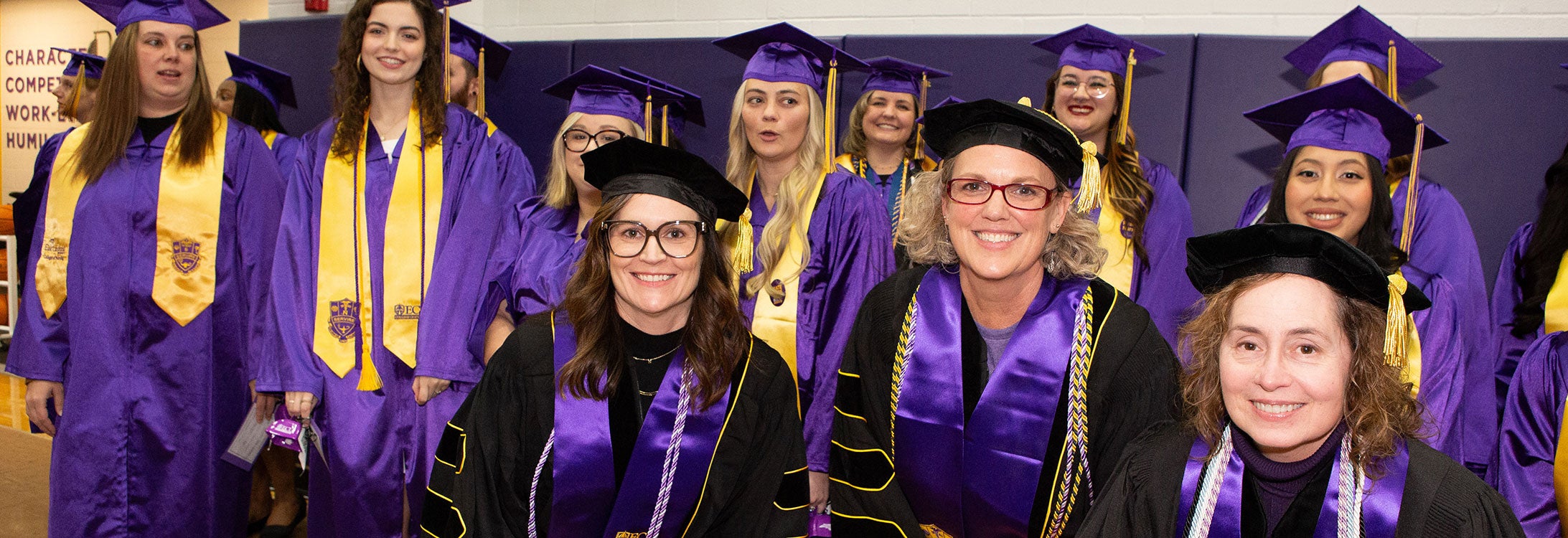Nursing faculty graduate with students as DNPs
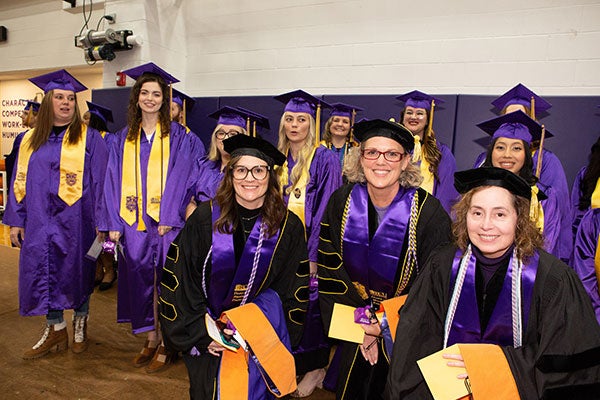
Drs. Kimberly Cherry, Jolene Spencer and Tristin Carpenter pose with some of their students at the College of Nursing graduation recognition ceremony Dec. 13.
Three of East Carolina University’s College of Nursing RN to BSN faculty members switched roles for the fall 2024 graduation ceremony — turning their own tassels to become some of eastern North Carolina’s newest Doctors of Nursing Practice.
Drs. Kimberly Cherry, Jolene Spencer and Tristin Carpenter all teach in the College of Nursing’s online program that gives registered nurses with a two-year degree the opportunity to pursue a bachelor of science in nursing degree, which greatly increases their capability for patient care and job opportunities.
Cherry, a family nurse practitioner, has taught at ECU since 2006. Spencer, an adult nurse practitioner, taught future nurses for two years, first at Beaufort County Community College before making the shift to ECU. Carpenter grew up in towns across North Carolina but attended ECU for all of her education — her BSN when the nursing school was on Fifth Street, her master’s in community health nursing in 2000 and now her DNP.
Why the DNP?
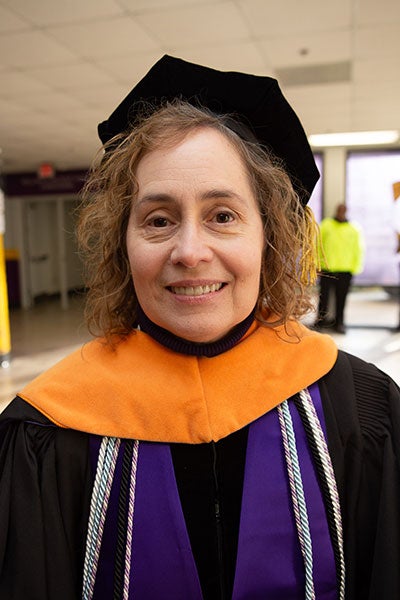
Dr. Kimberly Cherry, a member of the RN to BSN faculty, graduated with her Doctor of Nursing Practice degree.
Carpenter started her career in inpatient rehabilitation, working with patients with head and spinal cord injuries. Later, she discovered community health nursing, where she was able to work with a wider range of patients of various ages and diagnoses.
She started teaching in 2006 while living in Alabama. After returning to North Carolina in 2008, she joined the faculty at ECU in 2010, teaching community health nursing in both the traditional BSN and the online RN to BSN program options at ECU.
When her children were old enough, and the College of Nursing needed faculty members to support necessary growth, she took a full-time teaching position in the online RN to BSN program.
In the past few years, Carpenter began mulling a terminal degree. An online course at another state university was her first option, but it required driving several hours once a week for in-person classes, which she “wasn’t looking forward to.” One of her friends, ECU nursing professor Dr. Jan Tillman, opened another door for her.
“Jan approached me about this DNP and said, ‘You know, we’re having people with public health and nurse education experience. You kind of tailor the program with electives.’ That sounded interesting,” Carpenter said.
For Carpenter, completing the DNP was a matter of finishing what she started.
“I’m kind of a completionist. If I start something, I like to finish it. I don’t have any interest in going anywhere else right now. I really like our program,” Carpenter said.
Cherry, already a two-time Pirate nurse, considered the DNP program because she had always filled a case manager roll both at work and at home, helping family and patients to find the most effective care. Having a doctoral-level education would make her a better caregiver. But it was the COVID-19 pandemic that solidified her decision.
“During COVID, I was on various hiring search committees, and I realized I probably wouldn’t get an interview based on my current degree because when I started in 2006 it was common for our faculty to have a master’s and teach. But over the years, as the nursing profession has changed, the DNP became expected, standard,” Cherry said.
She was accepted at another North Carolina school but said that when she compared the two programs side-by-side, “ECU really offered more flexibility for me and fit my life.”
Like many of her students, Cherry said she needed a fully online program to be able to balance teaching and learning. She was willing to invest the time, but it needed to be on her time.
Spencer said she values teaching her undergraduates but considered pursuing her Ph.D. so she could branch out and teach graduate students, and being a role model for her students was a big part of returning to the classroom.
“There is a small portion of students who say, ‘I do want to return to graduate school, perhaps not right away, but in a few years.’ Several of them have mentioned they want to earn their DNP,” Spencer said. “So as a faculty, I felt that if I have students that I’m mentoring who one day plan to return to earn their DNP, shouldn’t I do that and set an example as well?”
All Students’ Successes
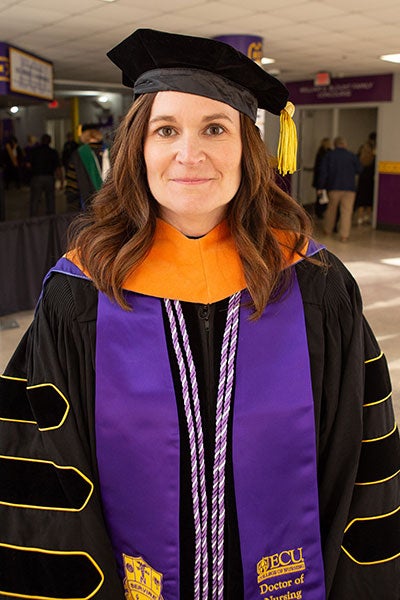
Dr. Jolene Spencer, a member of the RN to BSN faculty, graduated with her Doctor of Nursing Practice degree.
Being students at the same time they were teaching their own helped the trio understand the needs of online learners. They partnered on their DNP project, which developed online modules for their community course in the college’s Virtual Clinic, an immersive digital simulation space that challenges students to think through their decision making when in a real-world clinical space.
For Carpenter, who puts a great deal of value in community health nursing, using simulation to encourage students to think about prevention of health problems was a natural fit.
“There’s such a good place for nurses to make an impact before people get sick, teaching them how to access resources, how to recognize and screen for illness. I really like the education piece. Public health is where my heart is, for sure,” Carpenter said.
Spencer said the support they got from the DNP faculty supported them through the challenges of teaching while learning and trying to balance that with caring for families and themselves.
“Everybody is human and has to face different aspects of their life while they’re going through this program. And we portray that to our students as educators,” Spencer said.
Cherry said it can be a challenge to have students in the RN to BSN program who have wildly different levels of experience — from newly licensed nurses just out of school to seasoned professionals looking to take the next step in their career after years at the bedside. She attributes the college’s ability to support such a variety of students due to high-quality faculty members and student support advocates.
“Our program would not be successful without our student success team,” Cherry said.
All three said teaching completely asynchronous, online classes is tremendously helpful for their students, many of whom work full time or live far from campus, but it can still be challenging to have no face-to-face interactions with their pupils.
“You don’t get to look at a student and read their facial expressions. You can’t see that they aren’t comprehending or aren’t able to get all the points you’re trying to get across when you’re in a face-to-face classroom,” Spencer said. “Online, you have to rely on their willingness to reach out to you to say, ‘I don’t understand this content or this concept.’”
But all three said they have found ways to try to keep students connected to one another, and their instructors, through engaged discussions and the sharing of photos of themselves and their families to build a sense of community.
Call me Doctor
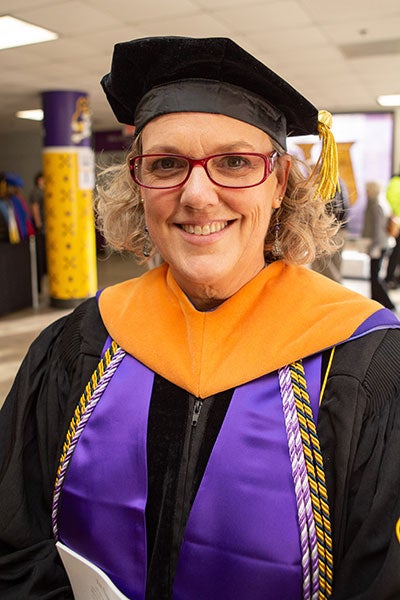
Dr. Tristin Carpenter, a member of the RN to BSN faculty, graduated with her Doctor of Nursing Practice degree.
All three women said taking on the title of doctor will be an adjustment, but one they are excited for.
Cherry said she met the degree requirements in July but started celebrating in May. She went with family to a theme park in Florida and wore a pin that read “doctor of nursing practice” on the rides.
Spencer completed her course work a few weeks before graduation in December, so she didn’t have the same celebratory lead time.
“I’ll be happy to have our families around us at graduation because they have supported us through this program,” Spencer said.
Family has been a major part of Cherry’s motivation to continue slogging it out when competing priorities got very demanding.
“It’s been great for my children to see how much work it takes to earn it, the sacrifice of time, but that if you put forth the effort and you organize you can do it. But it doesn’t mean you’re not going to be juggling some responsibilities and maybe saying no to some things in the interim in order to meet your goals,” Cherry said.
Spencer found herself in the same boat.
“It’s really important that they participate in the ceremony and see what the reward is, why you can’t go to your baseball game, why you had to miss out on things,” Spencer said.
Carpenter said being an established nurse, and nursing educator, made the experience of being in academia feel second nature for her, but the work was still a challenge. Having friends to share the teaching and learning load has helped her on the path to graduation.
“I couldn’t ask for a better scenario for the whole thing,” Carpenter said.
